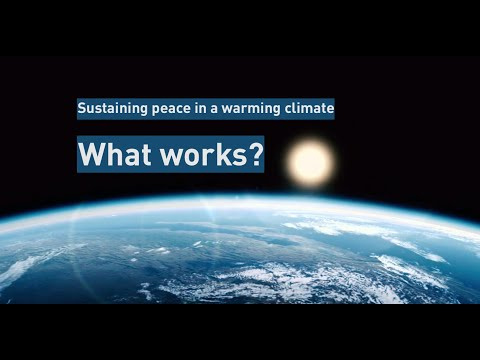Sustaining peace in a warming climate - lessons learned
In this video, international experts share insights on what they have learned through fieldwork and research. The connection between climate change and peacebuilding is becoming ever more evident, but conflict dynamics depend on specific regional contexts. Therefore programmes need to address local drivers of conflict and climate change impacts jointly in order to cross sectoral lines and be more holistic.
The video includes interviews with: Henk-Jan Brinkman (UNPBS), Larry Attree (Saferworld), Mohamed Yahya (UNDP), Rachel Slater (ODI), Robert Ricigliano (Omidyar Group) and Alexandre Marc (World Bank), and Janani Vivekananda (adelphi).
Lessons:
- CLIMATE-SENSITIVE PEACEBUILDING: Think about future climate impacts in your peacebuilding programmes.
- CONFLICT-SENSITIVE CLIMATE ACTION: Think about conflict in your climate adaptation and mitigation programmes.
- INCLUSIVITY: Understand and address existing gender and generational inequalities.
- INTEGRATED APPROACHES: Tap into the synergies of different development goals.
Transcript
Voice over:
"In a changing climate, our efforts to create peace and safeguard security must also change. Development, humanitarian and peacebuilding initiatives can no longer be blind of future climate impacts. But what works? What have we learned through our field work and research to sustain peace in a warming climate?"
Janani Vivekananda, Senior Project Manager, adelphi:
"Sustaining peace in a warming climate means that when we look at peacebuilding and when we are looking at the root causes of conflict, we understand the environmental and the climate change implications to the drivers of conflict."
Henk-Jan Brinkman, Chief of Policy, Planning and Application, United Nations Peacebuilding Support Office (UNPBSO):
"If you are resilient, if you have the institutions that can mitigate the conflict, then it doesn’t automatically lead to violent conflict. And that is why you really need to build a peacebuilding approach and think about the conflict dynamics in your climate adaptation and mitigation programmes."
Larry Attree, Head of Policy, Saferworld:
"At the moment, gender is seen as a kind of normative thing. ‘Let’s include more women’, ‘let’s work towards women’s equality in peacebuilding concepts’, but we want to say that working on gender norms is actually strategic. It is part of the peace strategy."
Mohamed Yahya, Africa Regional Programme Coordinator, United "Nations Development Programme (UNDP):
"The generational gap is also some of the things that have to be dealt with, which means give an opportunity for young people in leadership and giving them access at that level also is important."
Rachel Slater, Head of Social Protection Programme and Research Fellow, Overseas Development Institute (ODI):
"We cannot have programmes that only try to address people’s access to water or their access to livelihood support. We need to try and find ways of bringing those things together. And there are some examples of programming. For example, programmes that try and build infrastructure at the same time as having objectives to reduce conflict within communities that can be really helpful in that regard."
Voice over:
"It is clear that countries’ priorities vary and that solutions depend on the specific context. Any action we take must therefore be based on a real understanding of the conflict dynamics and be sensitive to environmental factors."
Robert Ricigliano, Systems & Complexity Coach, The Omidyar Group:
"I think when you start to look at how we cross sectoral lines and be more holistic, that is actually the real key to a peaceful solution. So it is peace, development, environment, human rights, you have got to look at them all together, you cannot pull them apart and expect we can deal with one and not the other."
Alexandre Marc, Chief Specialist, Fragility, Conflict and Violence Group, World Bank:
"I hope that the international community will be able to become more flexible, less doctrinary, more adaptable, listening more to what seems to work or not work from their partners in–country and that we will be able to be less fragmented, more united, and more in the listening mode than we have been up to now."










